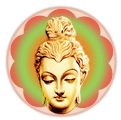- Tham gia
- 15/6/06
- Bài viết
- 1,138
- Điểm tương tác
- 1
- Điểm
- 38
Một vị ThiềnTăng hỏi ngài Mục Châu:
"Một hơi thở tụng hết một tạng kinh không?"
Ngài Mục Châu đáp:
"Có bao nhiêu bánh đem hết lại đây .”
(Tức là trên bàn có bao nhiêu bánh đem hết lại đây, đơn giản làm sao! )
Khen: “Buông tay đến nhà, chẳng nhọc tiến bước.”
Bàn:
Một hơi tự khéo tụng tạng kinh,
Vạch lá tìm cành chẳng nhọc mình,
Vô biên huyền nghĩa đều hiện rõ,
Hỏi đến Sơn tăng thảy chẳng minh.
-----------------------------------
Ngài Mục Châu là Trần Tôn Túc, hiệu Đạo Minh, là vị Thủ tọa bảo ngài Lâm Tế đi hỏi Tổ Hoàng Bá ba lần, là một tay cự phách ở hội Tổ Hoàng Bá.
Khi ngài về Mục Châu có người đến hỏi: Một hơi thở tụng hết một tạng kinh không?
Câu hỏi quá rắc rối.
Ý bắt từ câu chuyện Tổ Bát-nhã được nhà vua mời dự trai tăng. Đến nơi chư Tăng siêng năng tụng kinh còn Ngài thong dong đi dạo. Vua thấy lạ mới hỏi: Sao Hòa thượng không đi tụng kinh? Ngài đáp: Ta thở ra không dính sáu trần, hít vào không kẹt ấm giới, mỗi ngày ta tụng không biết bao nhiêu bộ kinh. Như vậy nói theo cách của Ngài là một hơi thở tụng hết ba tạng kinh! Chúng ta hiện nay thở ra hít vào dính kẹt đủ điều, nếu thở ra không dính sáu trần, hít vào không kẹt ấm giới thì tự tại biết bao nhiêu! Như vậy dường như không tu mà thật tu, còn cố gắng tụng hết bộ kinh này sang bộ kinh khác, dường như tận lực tu hành nhưng rốt lại chỉ được phước, chớ thật chưa biết chuyển vô minh phiền não trở thành Bồ-đề; vì tham tụng cho hết bộ để được phước nhiều nên vẫn còn phiền não. Trái lại thở ra hít vào mà không dính kẹt gì cả, đó mới thật là tụng kinh.
Đáp câu hỏi của vị Tăng, ngài Mục Châu không nói hết, không nói không, chỉ bảo: Trên bàn có bao nhiêu bánh dọn ra ăn. Trả lời thấy như lạc đề nhưng chính đó là điểm hay, nếu vị Tăng biết, là thấy được bao nhiêu tạng kinh rồi. Thế nên lời khen:
“Buông tay đến nhà, chẳng nhọc tiến bước.” Ngay đó thấy gì nói nấy, không phải suy gẫm tìm kiếm.
Bàn:
Một hơi tự khéo tụng tạng kinh,
Vạch lá tìm cành chẳng nhọc mình.
Vô biên huyền nghĩa đều hiện rõ,
Hỏi đến Sơn tăng thảy chẳng minh.
Nghĩa là không nhọc nhằn vạch lá tìm cành, mò từng chữ từng câu, nếu không còn dính mắc thì bao nhiêu huyền nghĩa đều hiện rõ. “Hỏi đến Sơn tăng thảy chẳng minh”, hỏi đến chữ nghĩa đều chẳng hiểu rõ nhưng tất cả đều đầy đủ .
--------------------------------[/code]
"Một hơi thở tụng hết một tạng kinh không?"
Ngài Mục Châu đáp:
"Có bao nhiêu bánh đem hết lại đây .”
(Tức là trên bàn có bao nhiêu bánh đem hết lại đây, đơn giản làm sao! )
Khen: “Buông tay đến nhà, chẳng nhọc tiến bước.”
Bàn:
Một hơi tự khéo tụng tạng kinh,
Vạch lá tìm cành chẳng nhọc mình,
Vô biên huyền nghĩa đều hiện rõ,
Hỏi đến Sơn tăng thảy chẳng minh.
-----------------------------------
Ngài Mục Châu là Trần Tôn Túc, hiệu Đạo Minh, là vị Thủ tọa bảo ngài Lâm Tế đi hỏi Tổ Hoàng Bá ba lần, là một tay cự phách ở hội Tổ Hoàng Bá.
Khi ngài về Mục Châu có người đến hỏi: Một hơi thở tụng hết một tạng kinh không?
Câu hỏi quá rắc rối.
Ý bắt từ câu chuyện Tổ Bát-nhã được nhà vua mời dự trai tăng. Đến nơi chư Tăng siêng năng tụng kinh còn Ngài thong dong đi dạo. Vua thấy lạ mới hỏi: Sao Hòa thượng không đi tụng kinh? Ngài đáp: Ta thở ra không dính sáu trần, hít vào không kẹt ấm giới, mỗi ngày ta tụng không biết bao nhiêu bộ kinh. Như vậy nói theo cách của Ngài là một hơi thở tụng hết ba tạng kinh! Chúng ta hiện nay thở ra hít vào dính kẹt đủ điều, nếu thở ra không dính sáu trần, hít vào không kẹt ấm giới thì tự tại biết bao nhiêu! Như vậy dường như không tu mà thật tu, còn cố gắng tụng hết bộ kinh này sang bộ kinh khác, dường như tận lực tu hành nhưng rốt lại chỉ được phước, chớ thật chưa biết chuyển vô minh phiền não trở thành Bồ-đề; vì tham tụng cho hết bộ để được phước nhiều nên vẫn còn phiền não. Trái lại thở ra hít vào mà không dính kẹt gì cả, đó mới thật là tụng kinh.
Đáp câu hỏi của vị Tăng, ngài Mục Châu không nói hết, không nói không, chỉ bảo: Trên bàn có bao nhiêu bánh dọn ra ăn. Trả lời thấy như lạc đề nhưng chính đó là điểm hay, nếu vị Tăng biết, là thấy được bao nhiêu tạng kinh rồi. Thế nên lời khen:
“Buông tay đến nhà, chẳng nhọc tiến bước.” Ngay đó thấy gì nói nấy, không phải suy gẫm tìm kiếm.
Bàn:
Một hơi tự khéo tụng tạng kinh,
Vạch lá tìm cành chẳng nhọc mình.
Vô biên huyền nghĩa đều hiện rõ,
Hỏi đến Sơn tăng thảy chẳng minh.
Nghĩa là không nhọc nhằn vạch lá tìm cành, mò từng chữ từng câu, nếu không còn dính mắc thì bao nhiêu huyền nghĩa đều hiện rõ. “Hỏi đến Sơn tăng thảy chẳng minh”, hỏi đến chữ nghĩa đều chẳng hiểu rõ nhưng tất cả đều đầy đủ .
--------------------------------[/code]
